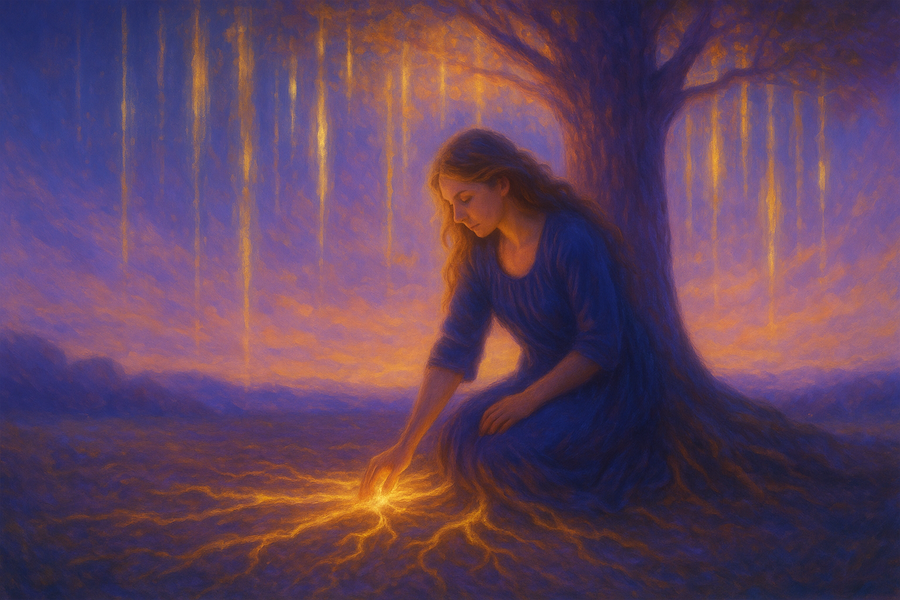Is our spiritual identity shaped by the shadow of our fathers?
What if the first man you trusted taught you that love must be earned?
What if your earliest experience of protection was silence?
What if the very figure meant to mirror your worth turned away… and called it love?
This article is for those whose fathers were “there”—but never with them. Who offered safety in theory, but not in tenderness. Who, through their absence or control, planted seeds of self-erasure. It is also for those ready to reclaim their voice, their worth, and their Solar Light.
The Father as Archetypal Light
The father is often a child’s first encounter with authority, order, and the idea of being worthy of love. When he is present in form but not in emotional truth—absent, inconsistent, or controlling—the child internalises a distorted model of leadership, love, and recognition.
This becomes the original template for how we relate to masculine energy in the world and within ourselves. Whether he ruled with indifference, charm, silence, or strictness, the impact remains: we learn to equate being loved with being good, being quiet, or being useful.
When left unexamined, this distortion becomes the silent undercurrent of our adult relationships with teachers, leaders, partners—even our concept of the Divine.
How the Father Wound Sets the Stage for Spiritual Grooming and Approval-Seeking
What light are we chasing when the Father is absent, silent, or controlling?
There was one Christmas when the tapestry of illusion started to unravel.
We sat around the table—my father, his companion (once a friend of my mother), her daughters and her grandchildren, who were being encouraged to call him Grandpa. I watched as the role I once held—where I had been seen, consulted, and quietly counted on—was now performed by others. I couldn’t help but blurt out my truth: “This is all fake.” No one replied. One by one, they left the room.
My father rarely raised his voice, but he couldn’t meet me in mine. He smiled often but never asked how I truly was. He could talk about the weather or sport, but not the aching in my soul. In time, I learned to silence my truth to preserve the illusion of harmony.
He wasn’t one to rage. He didn’t chase. He didn’t plead or protest. He wounded with silence.
When my mother left, he did nothing. When my beloved puppy Olive died in tragic circumstances, he stood still. When I stopped trying, he simply withdrew.
This is the subtle violence of non-response—the haunting ache of “Am I not even worth a reaction?”
It is covert neglect disguised as helplessness, placing the emotional burden on the child to hold what was never named.
For the empathic child, it seeds a dangerous belief: If no one moves toward me, I must be the one who is wrong.
This is how the father wound begins: not in absence alone, but in the betrayal of presence that refuses to see.
When the first masculine figure in your life withholds emotional presence, it creates a vacuum—a hunger for affirmation, structure, and recognition. As adults, we unconsciously seek out authority figures who echo that energy. Spiritual teachers, coaches, even “divine” guides may become the mirrors through which we try to win the approval that was never freely given.
We mistake performance for power. We equate visibility with worth. And when a mentor finally sees us, we might call it divinity. But without healing the father wound, that recognition becomes currency—we spend ourselves trying to earn it again and again.
Masculine Domination and Avoidance of Shadow
Culturally, the masculine archetype has long been rewarded for controlling the outer world rather than exploring the inner. Rationality is praised, while emotion is dismissed. Power is revered, while vulnerability is feared.
The result is a society of fathers and sons who bypass the feminine within—unable to meet their own softness, sadness, or shame. This creates a model of “strength” that is actually fragility in disguise. The inability to face one’s inner chaos becomes cloaked as superiority, stoicism, or spiritual bypass.
When emotional presence is absent, domination takes its place.
Why We Confuse Control and Conditional Care with Safety
What do we inherit when love is given through condition or performance?
There were moments that didn’t seem loud enough to call betrayal—but my body felt them as wounds.
I had welcomed her at first, even bought gifts on Mother’s Day, perhaps in rebellion against my own. But after I spoke the truth at Christmas, the warmth shifted. Her remarks became subtle jabs, timed for when no one was present. I once confided my fear that I was being pushed out of the family in my aunty, hoping she might intervene, or at least validate what I was sensing. But, although she felt it, she too met me with silence, choosing loyalty to the illusion over presence with my pain.
So I smiled. Stayed quiet. To be easy. My jaw locked, my spine began to ache. Eventually, my body broke down with TMJ and a prolapsed disc. The pain said what I wasn’t allowed to speak.
This is what happens when we confuse control for care. When the people who shape us condition love on silence and compliance, we internalise distortion as normal. We believe we are safe when we are not seen. And we begin to think that comfort means invisibility.
In the absence of steady, attuned presence, we often mistake control for love. A parent who micromanages our life but never sits in our sadness may appear “involved.” A teacher who demands loyalty in exchange for access may seem trustworthy.
The conditioning runs deep: if love was conditional at the start, we may not recognise healthy, mutual love when it finally arrives. Control feels familiar. Conditional affection feels safe. But true safety is never transactional.
Spiritual Ego as Unmet Father Hunger
Many who rise in spiritual or leadership circles do so from a place of deep unhealed yearning—the hunger for the father’s approval. When this longing is unconscious, it can be dressed in robes of enlightenment.
Charisma becomes a substitute for compassion. Authority masks insecurity. Followers become emotional currency.
But what the soul truly seeks is not to lead others—it’s to be seen by the father who never really looked. Until that hunger is met within, the spiritual path can become a subtle reenactment of childhood wounding.
How Healing the First Masculine Imprint Restores Self-Worth, Voice, and Value
Can we become sovereign beings without healing the one who first shaped our sense of power?
I carried the wound into love, though I didn’t see it at first. I chose partners who were charming but unavailable—who praised my light but flinched at my depth. I performed for closeness, downplayed my needs, mistook attention for attunement. And when I finally asked to be held, I felt ashamed for wanting something so simple. It took years to realise: I wasn’t needy. I was starved.
To heal the father wound is to reclaim our inner authority. We stop outsourcing our sense of worth to those who resemble the past. We stop chasing the nod, the title, the pat on the head.
Instead, we speak. We feel. We become the ones who validate our inner child. We begin to see that we are not broken—we were simply never mirrored clearly.
And that shift changes everything.
Healing as Reclaiming the Inner Solar Masculine
True healing does not mean rejecting the father—but reclaiming the Solar Light he failed to embody. It is the act of becoming the one who shows up. The one who listens. The one who leads with love, not control.
This is the return of the Inner Father—radiant, clear, accountable, and attuned.
You begin to hold space for yourself. You stop negotiating your truth. And you radiate not for approval, but because you are aligned.
You become your own sun.
From Invalidation and Silence to Embodied Worth and Sovereign Expression
Who do we become when the Father is a wound, not a guide?
When I began to speak the truth—softly, yet clearly—I was cast as the problem. My father would not hear me, and others followed suit. A friend of my parents was told I had “left the family” and that my father was distressed. But my own distress—the years of confusion, pain, and quiet endurance—was never acknowledged. I hadn’t left. I had simply stopped participating in the pattern. But in systems built on silence, those who speak are often the ones exiled.
Does unhealed lineage become the mask we wear as truth?
The child who was told “you’re too sensitive” grows into the adult who doubts their intuition.
The daughter who watched her emotions dismissed becomes the woman who learns to override her body.
But something stirs. A refusal. A remembering.
You begin to speak truthfully, even when it shakes the room. You stop keeping others comfortable at the expense of your soul. And in doing so, you become the very presence you were waiting for.
Choosing the Inner Father
What if the ‘light’ we followed was a mirror of the masculine we never questioned?
It didn’t happen all at once. But slowly, as I stopped waiting to be met, I began meeting myself. I became the one who stayed. The one who listened. The one who softened in all the places that had been braced for decades. And as I did, my body began to heal—jaw unclenching, spine lengthening, breath returning. I no longer needed to be chosen. I had chosen me. The light I had searched for in others had always been rising from within.
This is the moment you stop seeking the divine in someone else’s gaze—and become it for yourself.
You call in the Divine Masculine within: present, attuned, safe, and unwavering. Not the voice of judgement, but of truth. Not the hand of control, but of calm guidance. Not the critic, but the guardian.
The Solar Light of the Inner Father begins to rise in you.
“I am the one I’ve been waiting for. And I will never leave myself again.”
Reflections
Journaling Prompts:
Where have I felt unseen or emotionally neglected by the masculine?
What did I long for that was never given?
What qualities of Divine Father energy do I now choose to embody or receive?
Suggested Practice:
Stand barefoot. One hand on heart, one on womb.
Speak aloud:
“I never left. I returned to my soul. And I will not explain my healing.”
Sovereign Worth
Your worth is original. Not earned. Not negotiated.
You are not invisible.
You are seen.
You are worthy.
You are whole.
This is my remembering:
I am the daughter who chose herself. The songbird who sang anyway. The lightbearer who stopped apologising for truth.
I did not leave. I rose.
With a Remembering Heart,
Victoria





Leave A Comment